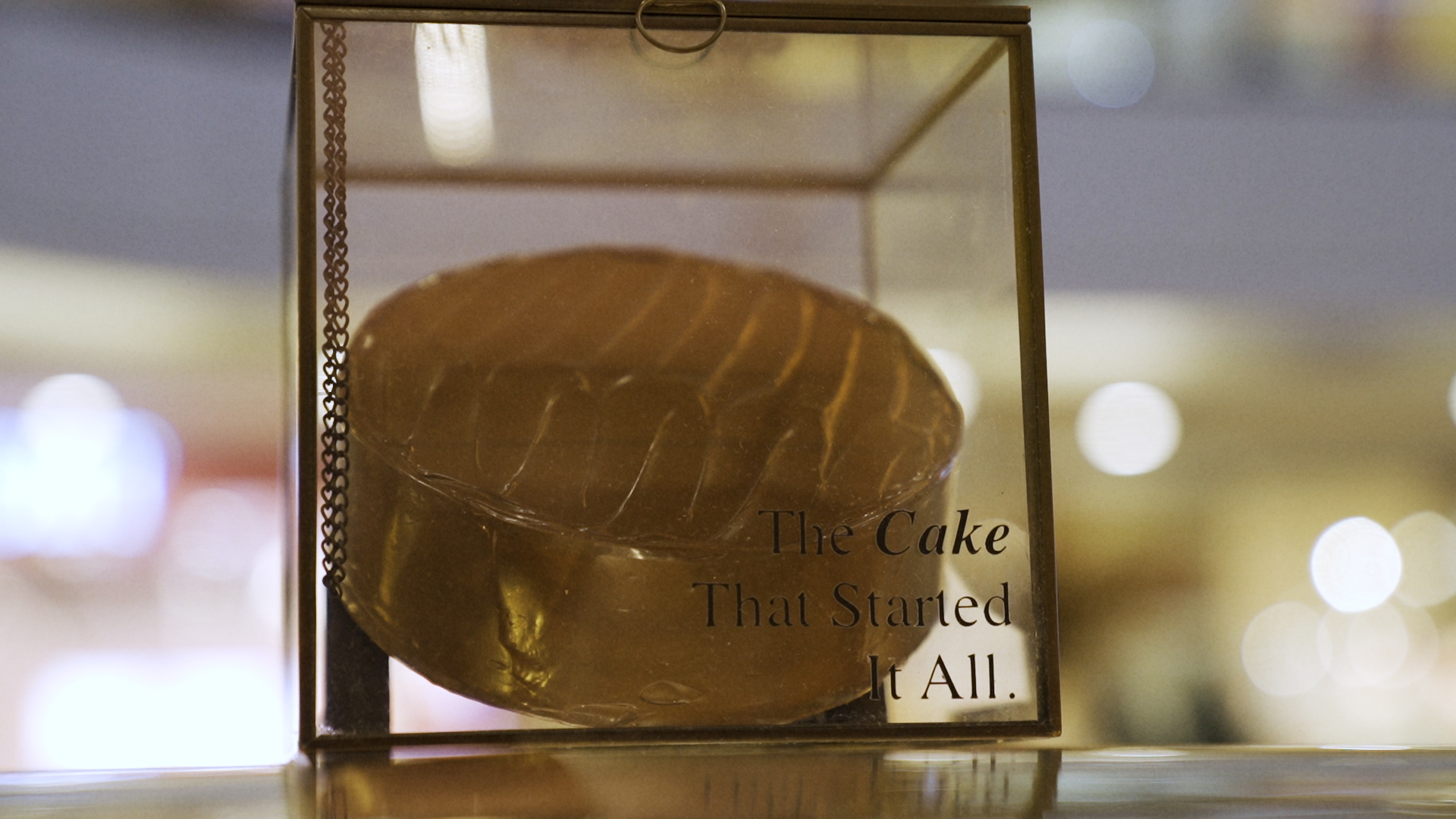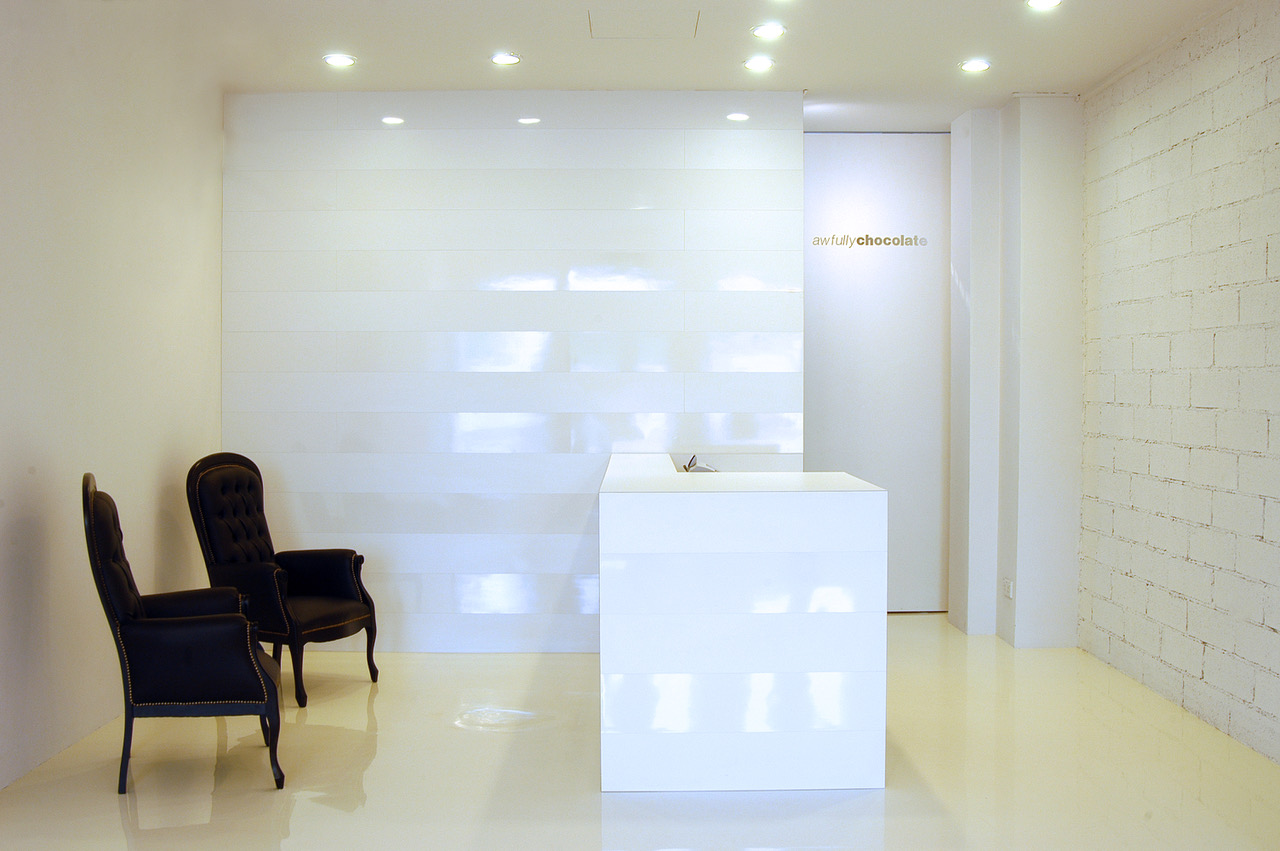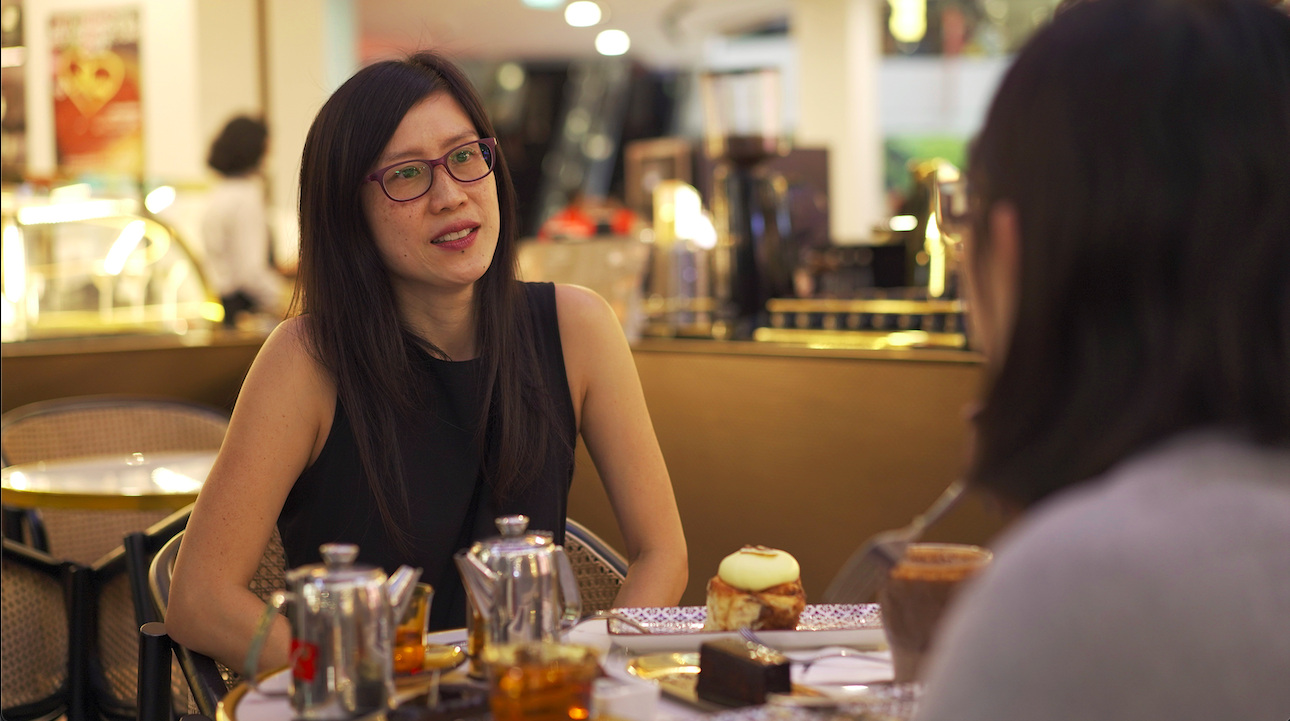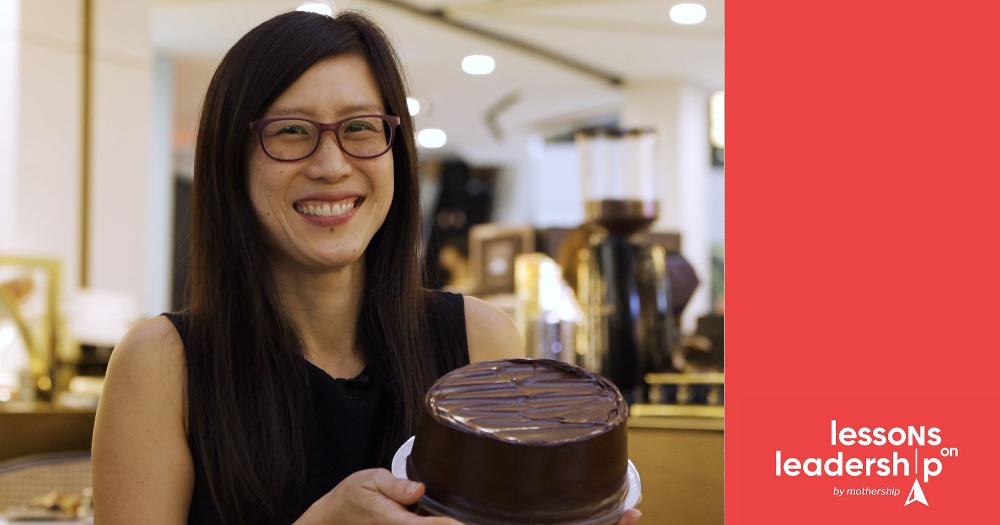The first thing Awfully Chocolate co-founder Lyn Lee wants people to know is that yes, she is but one of a group of people behind the brand.
"Everyone else says 'leave us alone. We want to bake, we want to do our thing'," she says to me, sitting down at a small table laden with a spread of chocolate goodies at Awfully Chocolate's Great World City outlet.
To this day, she says her icing handwriting continues to be "less-than-perfect", and the one thing she permits herself to take credit for is the red flower (sometimes it's a rose, sometimes it's a camillia) brooch her staff wear on their uniforms at Awfully Chocolate shops and cafés.
But taking these self-effacing quips from her at face value would be a considerable mistake. Now 47, Lee benefits from starting early — she and her friends founded Awfully Chocolate when she was just 24 years old, and the brand effectively grew with her, giving it a far longer runway (ahem) to expand even further.
Her idea to put their heads together to create a cake that she, at least, can eat — and enjoy — every single day and not get tired of it, was what set off a year's worth of weekends spent huddling over mixing bowls, crouching in front of ovens, experimenting with various ingredient brands and proportions — culminating in a cake that was made from a chocolate they engineered with their own specific blend of cacao beans.
This one:
 The sole item Awfully Chocolate's founders staked their effort and investment into — thankfully, it became a runaway success. (Photo by Zenn Tan)
The sole item Awfully Chocolate's founders staked their effort and investment into — thankfully, it became a runaway success. (Photo by Zenn Tan)
“I told my partners I had this idea of my perfect chocolate cake, something I could eat every day; not too rich, not too sweet and not creamy. I was lucky that they believed in and supported my vision enough to start a whole business around one cake, because we did not have anything else to go on other than our gut feel.”
It was certainly under her leadership that this motley group of friends went from selling one whole cake, that wasn't even available for display or in slices, to a total of 45 outlets (including restaurants, cafés and shop fronts, as well as their sister brand Sinpopo) in Singapore and China, boasting a full suite of chocolate products and kept running by some 170 staff locally, not counting the 350 people running the 27 outlets overseas.
She tells me even in this regard that everything was a team effort, reminding me of this frequently — that she just happens to be fronting it.
First shop opened more than two decades ago
Personally, I am struck by how long Awfully Chocolate has existed as a brand. Indeed, its first shop in Katong was opened in 1998, to naysayers ranging from their packaging supplier, who was convinced they had over-ordered their cake boxes, to others who said they would be pulling their shutters down in three months.
With how established the brand is today, its origin story has already been told and retold in many different places (by Lee, too, no less), so instead I set out trying to understand the foundations upon which this homegrown chocolate empire was built.
How it began: a venture adventure
 The interior of Awfully Chocolate's Cluny Court shop, from way back when. (Photo via Awfully Chocolate's website)
The interior of Awfully Chocolate's Cluny Court shop, from way back when. (Photo via Awfully Chocolate's website)
The unorthodox beginnings of Awfully Chocolate — a group of people with no formal training in any of the fields the company operates in today (baking, retail, service/sales/hospitality/marketing, etc) who, as Lee describes it, "believed in trying out a venture together" — reflects how differently they did things starting out.
"It was an adventure! Because when you start something, that's what it feels like, right. And it's got to be a bit fun. But it's got to be a bit scary. And that was the idea.
We believed in what we were doing. Even though we had not received maybe very technical or very formal training, we had enough experience, we felt, in our various jobs, to come up with good ideas, and to have some sort of planning on how we thought it would succeed. And it could succeed, but no one could guarantee success. That's why it's called a venture adventure. And it was with that spirit that we started all this."
Why an adventure? Because Lee says there were all kinds of challenges and obstacles that were thrown their way — and it's a cycle; over the years, it regrettably doesn't get easier.
"If you talk to anyone who has been in business for 20-over years, it doesn't get easier. In fact, sometimes we'll feel that wow, every few years throws up a different kind of challenge, you know — whether it's manpower, or people's ideas changing, or tastes changing, or anything; the pandemic!
The pandemic is the largest thing. I think, for most businesses, it would have been the craziest challenge that we ever faced. And so you have to keep on going, but you do draw upon lessons. So if I were to look back, and I were to look forward as well, I think that is the spirit that keeps us going."
Making, acknowledging, adapting quickly and learning from mistakes
 Photo by Zenn Tan
Photo by Zenn Tan
And being on a venture adventure necessitates the experience of having the gumption to stick to your guns if you think something is worth doing, despite what anyone else says, Lee adds — even if it turns out to be an error.
"So it's also about trying — if you never try, you never make the mistake, you'll never learn. The business journey is always about making tonnes of mistakes as well. But then the question is, what do you do from the mistake? Do you then give up? Or do you then say, Okay, that was dumb. This is what we ought to do. What do we need to do to learn from it? How do we go forward?
And so you know, I think if I could pick up something from that, that is the value. It doesn't come in one word. It's the ability to not be afraid to try; having made your mistake, figure out what you need to do not to make that mistake again, but pick yourself up and go forward. Can I call that the most important value? Because I think that's what it is."
Further, if there's anything the past year has reinforced for the company and her team of leaders, Lee says, it definitely was the need to be highly adaptable.
"I suppose the other characteristic of a life of venture and adventure is that things change. Right? And you've got to roll with it. And it's great that everyone is adaptable. And we've talked about it, in society, that we've had to be adaptable, especially in the past year.
But even before the past year, I feel that if you want to succeed in anything that you do, you do need to take life with its rolls and its punches and adapt."
The higher you go in your career, the harder you have to work
 Their truffles are pretty solid, just sayin. (Photo by Zenn Tan)
Their truffles are pretty solid, just sayin. (Photo by Zenn Tan)
Here's something some people may already understand, but bears repeating — the higher up one moves in their career, the harder they must work.
And at Awfully Chocolate, Lee affirms that there is no task her core team of founders feels is beneath them to do.
"In fact, I think you will find, the more accomplished a person is in the organisation, the more things that they have done, the more experiences they've had. Which you might be surprised, as you know, 'you mean your CEO used to clean tables?? she used to serve customers??'
And I'll tell you, yes, there is no one in middle or higher management in Awfully Chocolate who has not gone through everything from bottom up, including myself. I was probably one of the first service staff, for my sweet customers who still remember me. And I try to go to the stores every weekend, every public holiday, because that's when you get to meet more people. And so many of you have less-than-perfect handwriting "Happy Birthday" cakes; that was me. Because after 23 years, some things cannot be fixed!"
So this is a thing Lee does — her own companywide management duties aside, she says prior to the pandemic and its various restrictions affecting retail and physical stores and eateries over the past year and a half, she would endeavour to visit her shops at least every other day.
Definitely on weekends and public holidays, though, because that is when she has the best opportunity to interact with customers on busy days at the shops.
"Sometimes I tell the customers, I'm so sorry, you kena me today, because my staff will probably be faster processing certain things...I don't want to just go down there and stand there over them. So I get down and I get stuck in. And I get excited and I go to the stores and then I start serving customers and then I'll drop a cake or I'll punch in a number wrongly then you see the customer going like — 'why is this person taking so long??' And I apologise on behalf!
But that's me. And I probably think that that has been imbued into a little bit of the culture — that we all like to get stuck in and involved and understand things. Because then I also ask, how are you able to create policies and make management decisions, if you have no clue what it's actually like to do those things and go through those things and, and do those motions? Before you can make management decisions about those actions and things, please get out, go there and understand it first by doing it yourself."
The importance of being open-minded
Having been in the business more than two decades now, Lee has also seen her fair share of candidates, hired and managed staff with a wide range of attitudes, priorities and work ethics.
And these days she looks for two things: open-mindedness, and a sense of adventure — the same adventure she and her co-founders embody.
"When I say open-minded, it's because I feel that our society has, being very small, has made everyone sort of have a very specific idea of what they need to do, or be, or study and achieve in order to make it in life. And I want to tell them that, look, there's a path for everyone. And don't feel that you have to conform to somebody else's idea or society's idea of what you need to be in order to be a success.
So you need to be open-minded, because there's a lot of pressure for you to follow that route; you need to challenge yourself and know that no, there's many different ways where I can find happiness, where I can find peace, where I can find success. And that's what I look for, in the people that we work with.
And a sense of adventure, because life is an adventure, nobody said it was going to be smooth and easy. So don't go into life expecting things to just fall into your lap, or to be very peaceful. But the better you are at dealing with challenges, I think the more successful you'll be, because you get trained in dealing and coping with them until they become milestones for you, actually, and you don't look upon them as such difficulties anymore."
Lee recognises, too, that candidates looking for jobs these days are concerned about work-life balance, convenience in one's commute, fixed hours, and a clearly-prescribed job scope.
"They appear to be questions which you're just putting up walls, because you've got this preconceived notion of, you're only going to work in a certain place with a certain address at a certain size. And you will only do those certain things. And that's not adventurous, and that's not open-minded. And I think you're dooming yourself for failure if you go into don't just say a job, any project with that mindset, which is different from having a plan, by the way, because we plan things as much as we can."
And hence, her advice to a young person reading this: Don't be too set in your ways about the job you're looking for.
"Open-mindedness is a quality that we're all going to need going into the new normal and into the future. So why not start it now? If you feel drawn to the the dynamism of the business world, or just doing your own ventures, doing your projects, or going on a ride, going on an adventure, then you have to be dynamic yourself. You cannot expect to work in a dynamic environment without you being dynamic.
If you want to work in a dynamic environment, but you don't want to have to travel and don't want to have to do anything out of a very specific scope, and you want to know that there's 10 other people in your department that can cover for you if you're not around, then you're not dynamic. So a dynamic environment would not want you."
The secret to success? Never acknowledging fully that there is success
That, Lee says, keeps her on her toes. She shares at multiple junctures in our conversation that the fulfilment she and her colleagues work toward comes from the joy her customers experience and feel from consuming their food and dessert — it's everyday anecdotes of them she shares, not so much the remarkable expansion the company has seen over the years, that light her face and even bring emotion to her voice.
"I think for anyone at Awfully Chocolate, as long as you buy the product, you enjoy it, that is worth all the hard work, and the little details and the squabbles like oh, it should be like that, it should be like that.
Because at the end of the day, whether it's the only thing that you can eat, or whenever it's just something for you for tea at the end of a stressful day and you just want to destress, it doesn't matter what form the purpose or the pleasure comes in. It's good enough. That's why we're here."
Watch the full interview with Lee on Facebook:
Lessons on Leadership is a new Mothership series about the inspiring stories of Singapore’s business leaders and entrepreneurs, as well as the lessons and values we can learn from their lived experiences.
Top photo by Zenn Tan
If you like what you read, follow us on Facebook, Instagram, Twitter and Telegram to get the latest updates.
